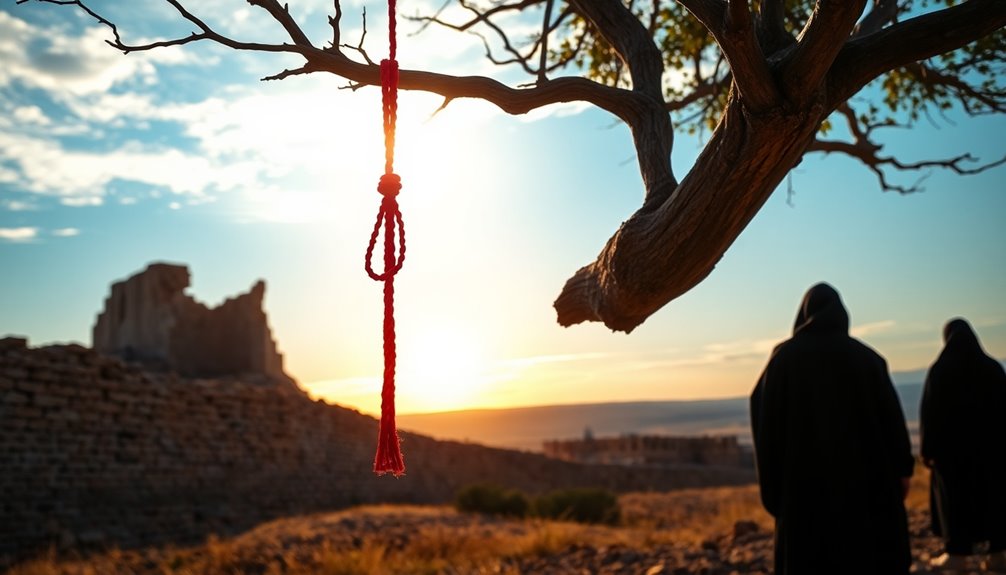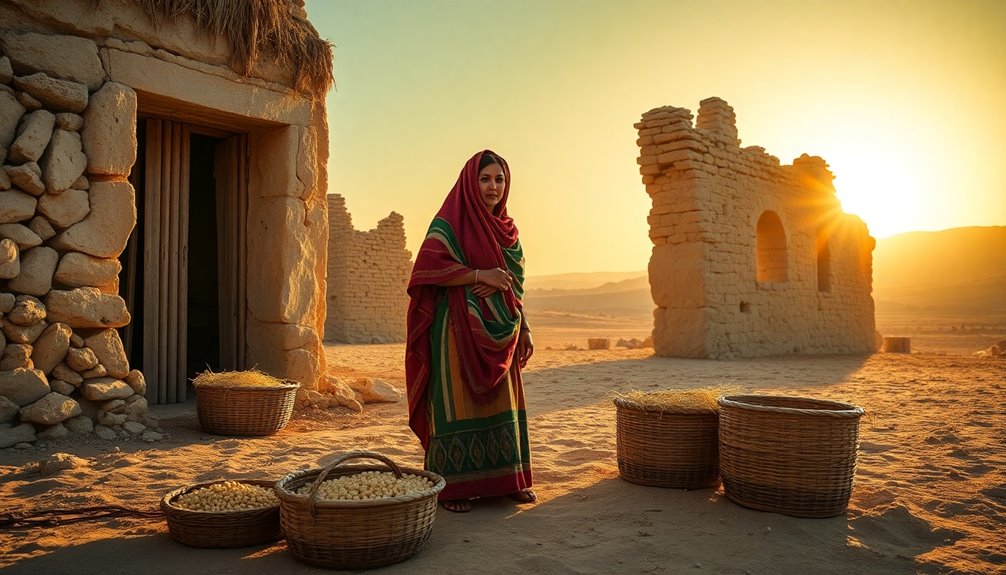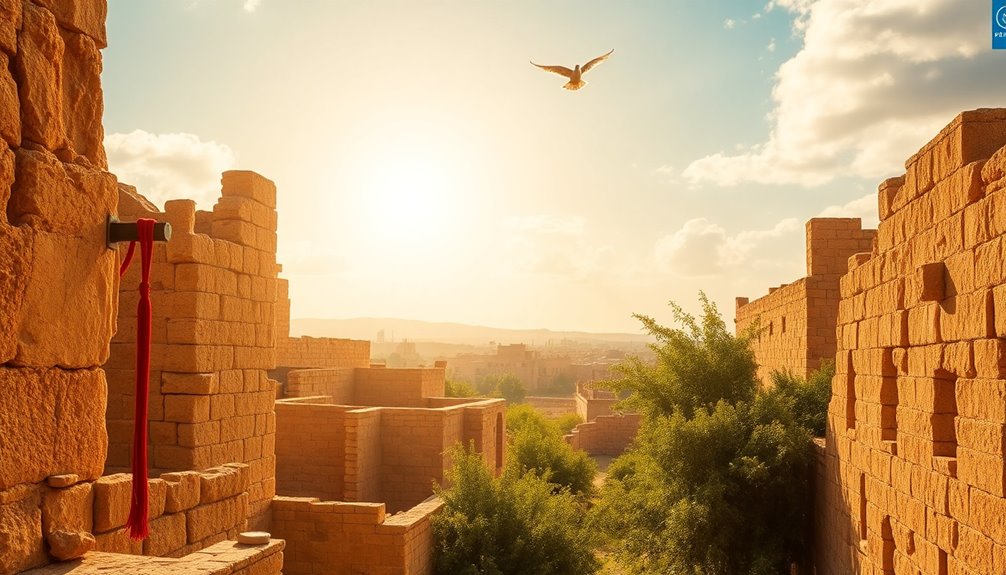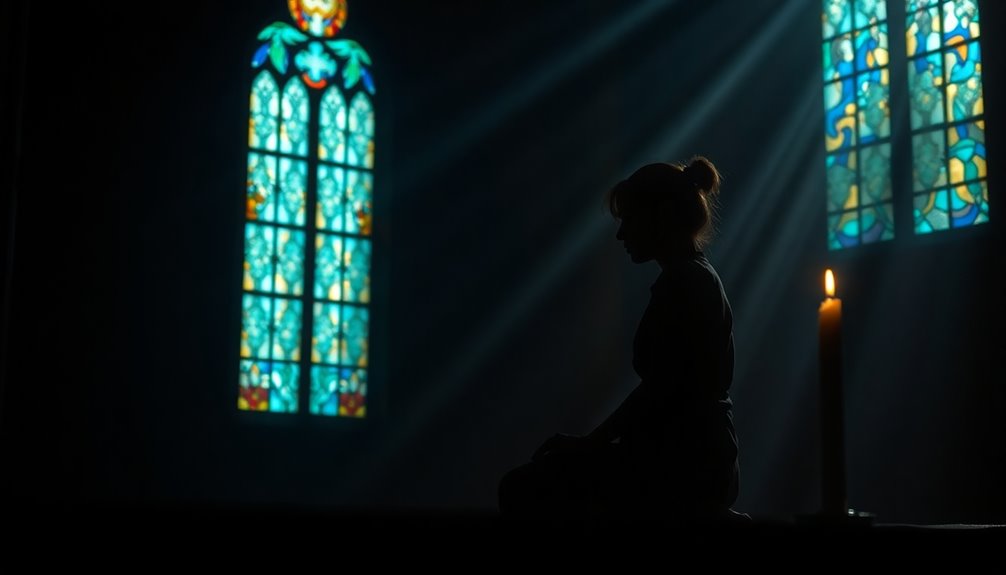Rahab is a key figure in the Bible, a Canaanite woman who showed incredible bravery and faith. You'll find her story mainly in the Book of Joshua. She hid Israelite spies, defying her society's expectations and risking her life for God's mission. By tying a scarlet cord, she demonstrated her faith and secured safety for her family during Jericho's fall. Rahab's legacy is profound; she's included in the genealogy of Jesus, symbolizing redemption and transformation. Her actions reveal a powerful message about loyalty and belief, and you'll uncover more of her impactful journey as you explore further.
Key Takeaways
- Rahab was a Canaanite woman and prostitute who played a crucial role in the Israelite conquest of Jericho.
- She hid Israelite spies sent by Joshua, demonstrating her bravery and faith in God's power.
- Rahab requested safety for her family, symbolizing her belief in the God of Israel and His protection.
- Her actions led to her and her family being spared during Jericho's destruction, integrating them into the Israelite community.
- Rahab is included in Jesus' genealogy, highlighting her legacy of redemption and faith transformation.
Introduction

In the biblical narrative, Rahab stands out as a pivotal figure whose actions significantly influenced the fate of Jericho and the Israelites. As a Canaanite woman and a prostitute, she defied expectations by aligning herself with the God of Israel. When Joshua sent spies to gather intelligence about Jericho, it was Rahab who took them in, hiding them from the king's agents. Her quick thinking and bravery not only protected the spies but also showcased her faith in God.
Recognizing the impending doom of her city, Rahab made a bold request for the safety of her family. She demonstrated her belief in God's power by hanging a scarlet cord from her window, a signal for the Israelite army to spare her household when they attacked. This act of faith sealed her family's fate, allowing them to escape destruction.
Rahab's legacy extends beyond her immediate actions; she's included in the lineage of Jesus Christ, as noted in Matthew 1:5. This inclusion highlights themes of redemption and the transformative power of faith, reminding us that anyone, regardless of their past, can play a crucial role in God's plan.
Scriptural Basis for Rahab

To understand Rahab's significance, you can start by examining the primary Bible references that outline her story.
Key passages in the book of Joshua highlight her bravery, faith, and the pivotal role she played during Israel's conquest of Jericho.
Additionally, secondary references in the New Testament further emphasize her importance in biblical history.
Primary Bible References
Among the key texts that highlight Rahab's significance in the Bible, the Book of Joshua stands out, particularly in chapters 2 through 6. In Joshua 2:1, you meet Rahab, a harlot living in the city of Jericho, who bravely hides two Israelite spies sent by Joshua. Her actions demonstrate her loyalty not only to the spies but also to the God of Israel.
As you delve deeper, Joshua 2:9-13 reveals Rahab's acknowledgment of God's power and her plea for protection for her family. She requests that they spare her loved ones in exchange for her loyalty. The spies agree and instruct her to hang a scarlet cord from her window to mark her home, as noted in Joshua 2:18-21. This cord symbolizes her faith and serves as a clear sign during the impending attack.
Finally, in Joshua 6:25, you see Rahab and her family spared during Jericho's destruction. This pivotal moment marks her integration into the Israelite community, showcasing her transformation and the fulfillment of the spies' promise.
Through these chapters, Rahab's story becomes a powerful testament to faith and redemption.
Secondary Bible References
Rahab's impact extends beyond her story in Joshua, as she appears in several key New Testament references that underscore her significance. In Hebrews 11:31, Rahab the prostitute is celebrated for her faith, as she protected the two Israelite spies, demonstrating an extraordinary belief in God's promise. This act isn't just about bravery; it reflects her deep faith and actions that led to her family's salvation.
James 2:25 further emphasizes this by illustrating that Rahab's faith was active, showcasing how her deeds complemented her belief. The scarlet cord she hung in her window becomes a powerful symbol of her obedience and trust in God's plan, echoing themes of redemption.
Additionally, Rahab's inclusion in Matthew 1:5 connects her directly to the lineage of Jesus Christ. As the mother of Boaz, she plays a pivotal role in the genealogy that leads to the Messiah.
This remarkable path from a Canaanite prostitute to a key figure in biblical history highlights the transformative power of faith and underscores the inclusivity of God's grace.
Canaanite Society and Customs

Canaanite society thrived under a complex web of polytheistic beliefs, where worship of deities like Ashtaroth shaped everyday life and customs. This belief system was deeply ingrained in the community, influencing everything from social interactions to rituals.
Within this structured society, urban centers like Jericho served as vital hubs of trade and governance, showcasing their importance in the socio-political landscape.
While the social hierarchy typically favored men, women could still hold influential roles, often managing households and participating in religious practices. Rahab exemplifies this, as she navigated her position within a patriarchal framework. Her hospitality stood out; she welcomed Israelite spies into her home, illustrating the Canaanite value placed on providing refuge to strangers.
Interestingly, the practice of prostitution often intertwined with religious rituals in Canaan, leading to a complex view of women like Rahab. They were seen as both marginalized and integral to the spiritual fabric of society.
In this context, Rahab's actions not only highlight her bravery but also reflect the nuanced roles women played in Canaanite society, balancing personal agency with societal expectations.
Cultural Context of Rahab

In the bustling city of Jericho, where the air buzzed with the fervor of idol worship and trade, you'd find Rahab navigating a complex cultural landscape. As a Canaanite woman living in a fortified city dedicated to the goddess Ashtaroth, she faced societal stigma due to her profession as a prostitute. Yet, her role might've transcended mere survival, as some suggest she could have been running an inn.
Rahab's actions during the impending Israelite conquest reveal her proactive nature in a patriarchal society. Amidst the chaos, loyalty shifted rapidly, and she recognized an opportunity to protect her family and herself. By forming an alliance with the Israelite spies, she demonstrated remarkable courage and strategic thinking.
Her eventual integration into the Israelite community highlights the theme of redemption, showing that societal barriers could be broken. Rahab's story isn't just about her past; it's about her transformation and the new identity she embraced.
Ultimately, her legacy extends beyond Jericho, as she became part of Jesus' genealogy, illustrating how loyalty and faith can lead to unexpected paths of inclusion and grace.
Rahab's Role as a Spy

Rahab's role as a spy often raises questions about her choices and motivations.
You might wonder how her actions align with moral standards and what misconceptions surround her story.
In this discussion, we'll unpack the implications of her bravery and the decisions she made to protect her family and fulfill her belief in the God of Israel.
Debunking Common Misconceptions
While many people view Rahab as a spy for the Israelites, the truth is quite different. Rahab didn't serve as a spy herself; instead, she played a crucial role in protecting the Israelite spies sent by Joshua and helped them escape from Jericho. Her actions were driven by her unwavering faith in the God of Israel, not a desire to engage in espionage.
Rahab gathered vital intelligence about Jericho's fear of the Israelites and communicated this to the spies, showcasing her bravery and strategic thinking. She cleverly hid the spies under bundles of flax, deceiving the king's men and ensuring their safety. This act of courage emphasized her loyalty to the Israelite cause rather than any spy-related motives.
Contrary to common misconceptions, Rahab's primary objective was to secure her family's safety through the agreement she made with the spies. This loyalty highlights her commitment to the Israelites, underscoring that she wasn't merely a spy but a pivotal figure in their mission.
Understanding Rahab's true role enriches your perspective on her character and the significant impact she'd during this pivotal moment in biblical history.
Moral Implications of Her Actions
The moral implications of Rahab's actions reveal a profound complexity in her character and choices. By choosing to hide the Israelite spies, Rahab demonstrated remarkable moral courage, putting their safety above her own in a dangerous environment. Her decision to deceive the king's men showcased a pragmatic ethics approach, prioritizing the welfare of a just cause over her nation's interests.
Rahab's acknowledgment of the God of Israel's power marks a significant moral transformation. Despite her Canaanite background, she aligns herself with the Israelites, demonstrating loyalty to a higher moral standard. This act of defiance against the oppressive regime of Jericho positions her not only as a protector but also as a symbol of resistance.
The scarlet cord she hung from her window served as a powerful signal, reflecting her commitment to the spies and the divine promise. It symbolizes her faith and moral conviction in her actions, illustrating that true loyalty often involves difficult choices.
Rahab's story reminds us that moral courage can emerge in unexpected forms, challenging us to consider the complexities of loyalty, ethics, and faith in our own lives.
Faith in Challenging Situations

When faced with life-threatening choices, Rahab showed incredible courage by hiding the spies and believing in their mission.
Her faith not only protected her family but also served as a powerful example of how trust in God can inspire community service in challenging times.
Let's explore how Rahab's actions reveal the strength of faith when the stakes are high.
Courage in Difficult Choices
Navigating life often demands that you step up and make tough choices, especially in challenging situations. Rahab's story exemplifies this courage. When two Israelite spies sought refuge, she faced the grave risk of hiding them from the king's men. By choosing to protect these men, she demonstrated loyalty not just to them but also to their God, recognizing the power that would lead to Jericho's downfall.
Her decision wasn't made lightly; it stemmed from a deep faith in the God of Israel, who she believed would deliver her from impending doom. In a brave move, she negotiated for her family's safety in exchange for her allegiance to the spies.
Lowering them down her window with a scarlet cord was a bold act of commitment to her decision. Rahab's actions not only saved her family but also highlighted the profound impact that faith can have in dire circumstances.
Her courage in making difficult choices not only changed her fate but also marked her as a pivotal figure in biblical history. When faced with tough decisions, remember Rahab's example of bravery and loyalty.
Faith in Community Service
Faith can transform a community, especially in times of crisis, as seen through Rahab's courageous actions in Jericho. When faced with the imminent destruction of her city, she made a bold choice to hide the Israelite spies, risking her life for their safety. This act of bravery wasn't just about personal survival; it reflected her deep faith and commitment to community welfare.
By negotiating for her family's protection in exchange for her loyalty to the spies, Rahab demonstrated a proactive approach that prioritized the safety of those she loved. The scarlet cord she hung from her window became a powerful symbol of not only her personal salvation but also her dedication to safeguarding her family's future within the Israelite community.
After Jericho fell, Rahab's integration into the Israelite nation illustrated the profound impact one person's actions can have on collective salvation. Her legacy in both the Old and New Testaments celebrates the significance of faith-driven actions in transforming individual lives and the broader community narrative.
Through Rahab, we learn that faith can lead to acts of service that uplift entire communities, especially during challenging situations.
Rahab's Legacy of Redemption

Embracing a legacy of redemption, Rahab's life story powerfully illustrates the transformative nature of God's grace. Once a prostitute in Jericho, she demonstrated incredible faith by protecting the Israelite spies. This act of bravery not only saved her life but also led to her family's salvation.
Her inclusion in the lineage of Jesus, as mentioned in Matthew 1:5, highlights that redemption is available to everyone, regardless of their past. Rahab became the mother of Boaz, placing her directly in the genealogy leading to King David and ultimately Christ.
The scarlet cord she used to mark her house became a symbol of God's protection and promise. This simple act of faith represented her trust in God's plan, showcasing that true faith is active and accompanied by deeds.
Rahab's story emphasizes the theme of inclusivity in God's plan for salvation, proving that individuals from unexpected backgrounds can fulfill divine purposes. Her legacy reminds you that no matter where you come from, you can embrace redemption and play a vital role in God's story.
Rahab's life challenges you to consider how faith and proactive actions can change not only your life but also the lives of those around you.
Additional Resources

What resources can deepen your understanding of Rahab's story and its significance in the Bible? To explore her role in aiding the Israelite spies during their mission in Jericho, consider reading the Book of Joshua, particularly chapters 2 to 6. These passages vividly illustrate Rahab's courage and faith as she protects the spies and negotiates her family's safety.
Scholarly commentaries can provide insights into her identity as a Canaanite woman and the implications of her profession. Some interpretations suggest she might've been an innkeeper, adding layers to her character.
Additionally, examining biblical genealogy, especially Matthew 1:5, reveals Rahab's critical role in the lineage of Jesus Christ, emphasizing her importance in God's plan.
Books and articles on themes of redemption and inclusion can further enrich your understanding of Rahab's legacy. They highlight how her faith transformed her identity, demonstrating that one's past doesn't define their future.
Podcasts or lectures on women in the Bible can also offer diverse perspectives on Rahab's impact on faith and redemption, enhancing your grasp of her story's significance in the biblical narrative.
Frequently Asked Questions
Who Is Rahab in the Bible and Why Is She Important?
When you consider Rahab, you see a woman whose actions changed the course of history. She hid Israelite spies, showing her courage and faith in God.
Her request for her family's safety highlights her loyalty and desire for redemption. The scarlet cord she hung symbolizes hope and protection.
Who Is Rahab to Jesus?
You see, Rahab plays a crucial role in Jesus' lineage as the mother of Boaz, making her an ancestor of King David.
This connection highlights God's grace, showing that faith can transform lives regardless of one's past. By acting on her belief, she not only protected the spies but also became a model of faith in the New Testament.
Her inclusion in Jesus' family tree emphasizes God's plan for redemption and inclusivity.
Did Joshua Marry Rahab?
You might wonder if Joshua married Rahab, but there's no biblical support for that idea.
Instead, Rahab's story emphasizes her bravery and faith when she protected the Israelite spies. She's traditionally recognized as the wife of Salmon, not Joshua.
Their narratives don't intersect in a marital context, and scholars generally focus on her role in Israel's history rather than any relationship with Joshua.
Who Was Rahab to King David?
To understand who Rahab was to King David, you need to recognize her as his great-great-grandmother.
She was a Canaanite woman who converted to Judaism and played a crucial role in Israel's history by protecting spies from Jericho.
By marrying Salmon, a member of the tribe of Judah, she became part of David's lineage.
Her story highlights how God's grace can reach anyone, illustrating the importance of redemption and inclusion.










